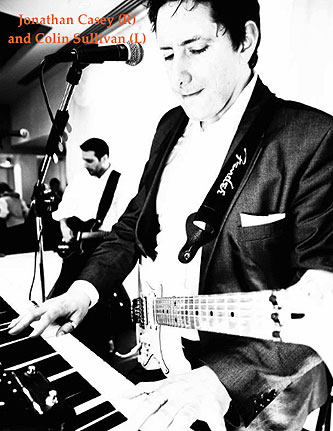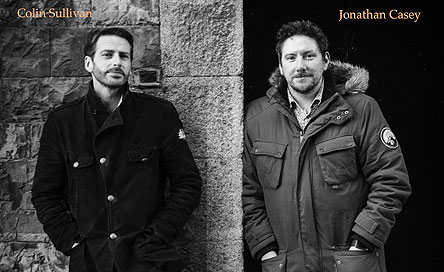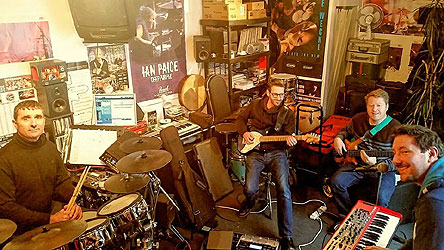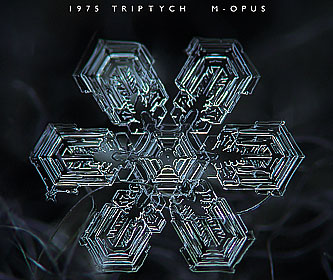 Dublin,
Ireland-based M-Opus takes you back in time to the future of
prog with their 2015 CD entitled 1975 Triptych. It’s
true these guys missed out on the incredible 1967 – 1973 era
of how rock morphed into progressive rock, yet they do their best
to find generation-spannng common ground on the 3 part CD, which clocks
in around 50 minutes. M-Opus centers around the talents of multi-instrumentalists
Jonathan Casey and Colin Sullivan who are joined on
the CD, in the studio by several drummers. M-Opus is definitely 21st
century progressive rock that borrows from anything including space
music, ethnic modalities and instruments as well as a new type of
prog. Casey’s vocals are effective and never intrude upon the
music, which is mostly fitted with extended instrumental passages
filled with soaring synthesized orchestral parts. Speaking about his
musical goals with M-Opus, Jonathan Casey tells mwe3.com, "I
had been composing music for TV and films; I must have written in
every possible style you can think of. Then I asked myself, given
that these clients get me to write music in the styles they want;
what if I was the client? If I had any choice, what music would I
want to hear and play? The sound of the 1970s is the sound that resonates
with me the most. Almost all of my favorite albums are from that time.
All of my favorite musical elements were there, symphonic aspects,
the rock sound, unusual rhythms, exciting musicianship, complex harmonies,
soulful vocals, exploratory ideals…So that was the answer. I’ll
pretend I’m back in that era and compose accordingly."
Well recorded and packaged with booklet and lyrics, 1975 Tryptych
by M-Opus is a solid, sci-fi influenced progressive rock album
for the 21st century. www.m-opus.com
Dublin,
Ireland-based M-Opus takes you back in time to the future of
prog with their 2015 CD entitled 1975 Triptych. It’s
true these guys missed out on the incredible 1967 – 1973 era
of how rock morphed into progressive rock, yet they do their best
to find generation-spannng common ground on the 3 part CD, which clocks
in around 50 minutes. M-Opus centers around the talents of multi-instrumentalists
Jonathan Casey and Colin Sullivan who are joined on
the CD, in the studio by several drummers. M-Opus is definitely 21st
century progressive rock that borrows from anything including space
music, ethnic modalities and instruments as well as a new type of
prog. Casey’s vocals are effective and never intrude upon the
music, which is mostly fitted with extended instrumental passages
filled with soaring synthesized orchestral parts. Speaking about his
musical goals with M-Opus, Jonathan Casey tells mwe3.com, "I
had been composing music for TV and films; I must have written in
every possible style you can think of. Then I asked myself, given
that these clients get me to write music in the styles they want;
what if I was the client? If I had any choice, what music would I
want to hear and play? The sound of the 1970s is the sound that resonates
with me the most. Almost all of my favorite albums are from that time.
All of my favorite musical elements were there, symphonic aspects,
the rock sound, unusual rhythms, exciting musicianship, complex harmonies,
soulful vocals, exploratory ideals…So that was the answer. I’ll
pretend I’m back in that era and compose accordingly."
Well recorded and packaged with booklet and lyrics, 1975 Tryptych
by M-Opus is a solid, sci-fi influenced progressive rock album
for the 21st century. www.m-opus.com
mwe3.com presents an interview
with
Jonathan Casey of M-OPUS
mwe3: Can you tell us where you’re from and what you like
best about it? Where is M-0pus based? It's hard to believe this is
a first album as it's so good…
 Jonathan
Casey: We are all from Dublin, Ireland, but I’ve moved 30
minutes out of the city to a rural area. I can tell you what I love
about where I am – I can look out our front window and our back
window and I see no other houses or buildings! I love to experience
frantic city living, but then go back to our quiet home full of my
noisy kids.
Jonathan
Casey: We are all from Dublin, Ireland, but I’ve moved 30
minutes out of the city to a rural area. I can tell you what I love
about where I am – I can look out our front window and our back
window and I see no other houses or buildings! I love to experience
frantic city living, but then go back to our quiet home full of my
noisy kids.
All of us in M-Opus are musicians for a living, so we scatter around
Ireland each week, playing with different groups. As musicians, we’ve
played in New York, Rome, Tokyo, Sydney – four corners of the
world really! I would love to do the same with M-Opus.
mwe3: Your first CD with M-Opus Triptych 1975 is kind
of your tribute to the music of 1975. What made you want to do this
kind of concept album of looking back on 1975?
Jonathan Casey: I had been composing music for TV and film...
I must have written in every possible style you can think of. Then
I asked myself, given that these clients get me to write music in
the styles they want; what if I was the client? If I had any choice,
what music would I want to hear and play? The sound of the 1970s is
the sound that resonates with me the most. Almost all of my favorite
albums are from that time. All of my favorite musical elements were
there, symphonic aspects, the rock sound, unusual rhythms, exciting
musicianship, complex harmonies, soulful vocals, exploratory ideals…
So that was the answer. I’ll pretend I’m back in that era
and compose accordingly.
Then I thought, why not make it a major project, release records from
other years too? I studied history of art in the university, so grand
concepts are something that really speak to me. The idea of a concept
that is maintained over several albums really got my motor running!
mwe3: Tell us how and when the M-Opus band formed and who plays
what on the CD and at live shows? Who else helps you achieve such
a great sound from the studio on to CD?
 Jonathan
Casey: M-Opus just started growing about 5 years ago. Colin (guitar,
vocals) and I (keyboards, vocals) were players in a very open, improvising
group called Magnum Opus, but as I was pushing the 1970s concept and
arriving with finished arrangements of the music you hear on 1975
Triptych, I can understand, ultimately, it wasn’t what the
others wanted to do. But Colin was into it and so we went off and
pursued the arranged music as M-Opus ourselves.
Jonathan
Casey: M-Opus just started growing about 5 years ago. Colin (guitar,
vocals) and I (keyboards, vocals) were players in a very open, improvising
group called Magnum Opus, but as I was pushing the 1970s concept and
arriving with finished arrangements of the music you hear on 1975
Triptych, I can understand, ultimately, it wasn’t what the
others wanted to do. But Colin was into it and so we went off and
pursued the arranged music as M-Opus ourselves.
Our live band is now me, Colin, drummer Mark Grist and bass player,
Darragh Dennis.
I write and arrange most of the material. On “Travelling Man”,
Colin came up with opening guitar riff, which is the first thing you
hear on the album, then I took that riff off on a journey. On “Wasps”,
Magnum Opus drummer Aran had come up with that lovely piano chord
sequence and Reich-like guitar pattern, which I really liked…
and wanted to turn it into a song about wasps, of course!
We were terribly haphazard in the way that we recorded the album,
here and there, bit by bit, in studios, rehearsal rooms, people’s
houses, because we had started with such vague plans. Different people
tried mixing it at different times or the same time. It was like Dr.
Frankenstein was the producer! Our future albums will be put together
with much clearer plans.
mwe3: Have you benefited by the recent resurgence in popularity
of prog-rock music? You were very young 40 years ago so you might
have missed the headiness of it all... Every day was like Christmas
40 years ago! Trust me on that. So what does 1975 Triptych mean
to you on a musical level? Is M-Opus prepared to go where no band
has done before?
 Jonathan
Casey: I reckon I have benefited; it was just nice timing really.
When I started on the M-Opus idea, I genuinely did not know if even
one person would be interested in it. It was just something I needed
to do for myself. But the reaction to it has been wonderful!
Jonathan
Casey: I reckon I have benefited; it was just nice timing really.
When I started on the M-Opus idea, I genuinely did not know if even
one person would be interested in it. It was just something I needed
to do for myself. But the reaction to it has been wonderful!
40 years ago, I was age zero! 1975 was the year I was born. So I can
only imagine what it was like to experience it all in real time, it
must have been beautiful. I will indeed trust you on that.
Musically, 1975 Triptych and M-Opus is what I always wanted
to have, a document. When I was a teenager, I always put my songs
into album order, I loved the art form.
In terms of going on the journey, yes, I really am prepared to bring
the whole concept to completion! Next up is the 1978 album… and
then, the breaking news is that there will be a 1973 and a 1983 album
after that, at the same time. There’s already some of 1973 recorded,
it’s all genuinely going to see the light of day.
mwe3: Would you say your sound is influenced by band such as
Caravan and Pink Floyd, who were both in their prime in 1975? How
about the instrumental sides to your music? Back then, instrumental
music was very popular. Long suites of music were the norm back in
1973 even more so than 1975!
Jonathan Casey: Pink Floyd are certainly an influence, in the
lush, grandeur of their music, the way they developed a concept with
a strong direction. There is such significance to their 1970s releases.
Instrumentally, I like to look at a rock band as a little orchestra,
just like those other great bands did back then... Genesis, YES, King
Crimson. I’ve composed a lot of purely orchestral music that
has been performed by orchestras around the world, and some of that
music has ended up in M-Opus but rearranged for a rock band! So it’s
gone full circle.
Yes, art rock is a big thing for me. I love Velvet Underground, Roxy
Music and then later, artists like Talking Heads, Kraftwerk, Laurie
Anderson. Some of that music is about music, in a sense, just as visual
art became a subject in visual art. Fusion also, Miles Davis, Mahavishnu
Orchestra, Return To Forever.
Whenever I’ve heard inspiring music, my feeling is like a child
seeing someone else with a toy: “Can I have a go?”! So now,
I get to have a go myself.
 mwe3:
What kind of guitars and keyboards do you play on the CD?
mwe3:
What kind of guitars and keyboards do you play on the CD?
Jonathan Casey: The guitars on the album are my Fender Stratocaster,
my Telecaster Cabronita and Colin’s Music Man and acoustic 12-string.
His amp is a Mesa Boogie.
The Telecaster and Music Man were stolen recently, along with our
van, desk and many other items, which was fairly devastating...
The basses are a Rickenbacker and a Hohner. Mark Grist plays Natal
drums. The piano is my baby grand in my living room, I have a Nord
Stage and then lots of lots of sound libraries on my PC for some nice,
old, keyboard sounds.
mwe3: What is the chemistry like between the members of M-Opus
and how did the band gel? I also see you also use the strings called
the Greenwich Village Orchestra.
Jonathan Casey: The chemistry is great, it’s always a
laugh! Col and I have been buddies for 20 years. Darragh (bass) always
has hilarious stories from the previous week and brings a mine of
jazz knowledge and know-how to the band. Mark (drums) is brilliant
and keeps us all organized, running the rehearsals, keeping notes.
Having a great atmosphere like that is really important to me.
Our previous bass player from Magnum Opus, he lived in New York and
got the Greenwich Village Orchestra, put that together. Outside of
the orchestra, we disagreed about the direction of the music –
basically we both wanted to be in charge! But this is me, my ‘day
off’, I couldn’t have someone telling me ‘you must
do this or that’ – I get enough of that when I’m doing
music for TV!
 mwe3:
Is there a single from the album? I was thinking of “Travelling
Man” or “Every Day The Orbit” as being effective singles.
mwe3:
Is there a single from the album? I was thinking of “Travelling
Man” or “Every Day The Orbit” as being effective singles.
Jonathan Casey: Even though singles don’t really feature
for a band like us, you do always think, is there a section of the
music that would work in isolation like that? I think you’re
absolutely right about those two tracks. They are both good at summarizing
certain things about the band in a few minutes. But there’s no
official single.
mwe3: Tell us something about the “Different Skies”
suite. It has eleven parts and runs almost 34 minutes! It’s like
a modern rock orchestral sound. Did you set out to do some kind of
magnum opus, as in M-Opus? Does the “m” stand for Magnum?
Is there a concept in play?
Jonathan Casey: All of 1975 Triptych deals with how
we interact with the physical world and “Different Skies”
is about people and the weather, the two in sync.
For instance, one section is called ‘Super Sonic Shock’,
and it’s about how we apply our intelligence to the environment,
like the way that the man in the street can calculate his distance
from lightning by counting the delay before he hears the thunder crack.
Or there’s ‘S.A.D.’ (also from “Different Skies”),
which touches on Seasonal Affective Disorder.
We think it’s an amusingly Irish thing to write a 34-minute song
about the weather! Irish people talk about the weather a lot because
it changes so often in our country, four seasons in one day.
I thought it would be an extended piece, but not as extended as it
ended up! As I was writing, I would listen to what was there, and
think, hmmm, it needs something here. That kept happening until I
felt right about it all.
I restated musical themes and motifs in the piece a lot, but it seems
the repeats are not terribly obvious to many! They’re quite disguised
at times.
 mwe3:
What interests you most about prog music as it’s come to be called
all over the world. A lot of bands deviate into folk, jazz and even
metal music but I would say M-Opus is definitely prog oriented. I
would even go a step further saying 1975 Triptych is one of
the first truly authentic sounding 21st century prog albums. Have
we left behind the last century yet?
mwe3:
What interests you most about prog music as it’s come to be called
all over the world. A lot of bands deviate into folk, jazz and even
metal music but I would say M-Opus is definitely prog oriented. I
would even go a step further saying 1975 Triptych is one of
the first truly authentic sounding 21st century prog albums. Have
we left behind the last century yet?
Jonathan Casey: Thank you very much for saying so! For me,
the initial premise of prog music is still fascinating and inspiring.
Bringing together the muscularity, immediacy and excitement of rock
instruments with exploratory, musical composition. So you’re
absolutely right... though I love jazz and metal, I don’t feel
like dragging other genres into the mix.
What helps is that none of us are very genre-specific as players,
so no one’s leading us somewhere by accident.
Having said that, myself and drummer Mark have a different jazz fusion
group together and the music is close enough in prog to be a ‘spin-off’
from M-Opus, part of the fictional band history in some way. Hopefully,
it will be like a Brand X album in the history of Genesis, given a
year like our other M-Opus albums.
mwe3: What’s your impression about the popularity of progressive
rock in 2015 and what interests you about prog-rock in other countries
beyond the U.K.? Is prog a world wide phenomenon and if so, what bands
are among your favorites?
Jonathan Casey: The impression I get is that progressive rock
is being assessed anew, by people who weren’t exposed to its
vilification, aren’t aware of it.
When I was growing up, it felt like this wonderful music was universally
hated, before I even got to hear much of it. But so much time has
passed, it’s no longer automatically panned, I don’t think.
Perhaps current tastes are less cynical, less quick to kick things
that are musically ambitious, than when I was growing up. That’s
my feeling anyway.
Here’s a thing... I often play with much younger musicians. Talking
to two different, full-time bass players recently, I discovered that
neither of them had heard of Peter Gabriel’s So. Never
mind not having heard it, they never heard OF it! These are players
who were born around 1990, so it’s not a mystery that happens,
but it shows how much time has passed and how things that were unmissable
at the time, can now be invisible. And the critical beatings things
received can also fade.
 mwe3:
What was it like working with King Crimson violinist David Cross in
his band? Also, I saw the video you made of the Peter Gabriel song
“Big Time”, how was that produced? And are more videos in
your future even DVD titles?
mwe3:
What was it like working with King Crimson violinist David Cross in
his band? Also, I saw the video you made of the Peter Gabriel song
“Big Time”, how was that produced? And are more videos in
your future even DVD titles?
Jonathan Casey: Working with David Cross, performing King Crimson
material live, was a dream come true. This was in 2000. I had done
absolutely nothing professional musically at that stage. I wasn’t
in a band gigging; I just had a demo of a couple of my songs. I read
that he was looking for a singer and I thought, what the hell, I’ll
send my little demo. When he called me up, it was the most fantastic
shock of my life!
I loved the whole enterprise and experience. We did 2 albums and toured,
but I just became way too busy around 2007 and had to call it a day.
I decided a cover of “Big Time” because it would be interesting,
because it was a song I had always loved, but also felt there were
other, more ferocious ways the music could be arranged and presented.
So it was an experiment really. I just put the video together myself
– YouTube was an extremely helpful tool! I quite like the idea
of doing a cover of the YES classic “The Gates Of Delirium”.
Maybe I’ll get around to that someday.
Next time, M-Opus will do a performance video, with the 4 of us playing
live. I’m tempted to have the visuals match the music, have it
look like a 1970s video, but then again, we are actually a real band
in 2015, so I don’t know. Dressing up, wigs could be fun, but
it could also be amazingly stupid!
 mwe3:
How about future plans? Are you really planning an album called 1978?
Actually 1978 is my favorite year in all of music history as it
all came together in time and believe me, prog-rock was huge that
year!
mwe3:
How about future plans? Are you really planning an album called 1978?
Actually 1978 is my favorite year in all of music history as it
all came together in time and believe me, prog-rock was huge that
year!
Jonathan Casey: Well I really hope you enjoy our new addition
to that year’s canon! 1978 is going to be a concept album with
a strong story and characters. I’ve been plotting it out for
some time, so I think the story is really good. The aim is to have
a graphic novel released at the same time. I have a comic book scriptwriter
working on that at the moment and lots of the album is already written.
And we’ll carry on, doing what we love to do!



